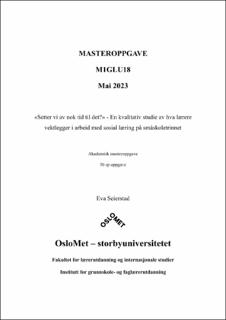| dc.description.abstract | Denne studien belyser hva lærere vektlegger i arbeid med sosial læring i småskolen. Sosial læring i skolen er et aktuelt tema i dagens skole der resultater og kompetansemål styrer mye av skolehverdagen. Kunnskapsløftet 2020 løfter frem at sosial og faglig læring ikke skal sees isolert hver for seg, men i sammenheng med hverandre. Sosial læring kan ha positive effekter på akademiske prestasjoner, og kan også fungere forebyggende, styrke motstandsdyktighet og elevens sosiale fungering. Sosial læring kan med andre ord ha stor betydning for elevenes danning og liv. Denne studien undersøker hva lærere anser som sentrale elementer i sosial læring, hvordan de forstår sin rolle i elevenes sosiale læringsprosess og hvordan lek kan være et verktøy for sosial læring. Studien har et kvalitativt forskningsdesign. Det er gjennomført tre semi-strukturerte forskningsintervju med tre lærere fra Østlandsområdet som alle har erfaring med småskoletrinnet. For analysen er det blitt gjort en tematisk innholdsanalyse i tråd med Ankers fire faser for analyse. Studien finner at lærere vektlegger utvikling av fellesskap og elevenes danning til å bli sosialt kompetente individer som mål for sosial læring. Lærerne er opptatt av å skape inkluderende læringsmiljø der elevene kan lære av hverandre og utvikle gode relasjoner. For å fremme sosial læring, er lærerne opptatt av å løfte frem det positive som skjer i læringsmiljøet og gode rollemodeller. Noen lærere peker på at elevmedvirkning har betydning for elevenes sosiale læring. Lærerne forstår sin rolle i sosial læring som å være et forbilde som selv har god sosial kompetanse, og som en veileder. Lærerne forstår lek som en arena for sosial læring, der barna har mulighet til å utvikle sosiale kompetanser og skape relasjoner. Lærerne gir uttrykk for at de opplever en målorientering i skolen og spør seg om det brukes nok tid på sosial læring i dag. I tillegg etterspør de at det snakkes mer om sosial læring på skolenivå og et mer systematisk arbeid som kan styrke elevenes sosiale læringsprosess.
This study sheds light on what teachers emphasize in their work with social and emotional learning in primary school. Social learning is a current topic in today's educational system, where results and curriculum goals govern much of the school day. The Norwegian curriculum “Kunnskapsløftet 2020” highlights that social and academic learning should not be seen in isolation from each other, but in conjunction with each other. Social learning can have positive effects on academic achievement and can also function preventively, strengthen resilience, and improve students' social functioning. In other words, social learning can have a significant impact on students' formation and lives. This study investigates what teachers consider the goal of social learning to be, how they understand their role in students' social learning process, and how play can be a tool for social learning. The study has a qualitative research design. Three semi-structured research interviews were conducted with three teachers from the Eastern region of Norway, all of whom have experience with primary school education. For the analysis, a thematic content analysis was performed in line with Anker's four phases of analysis. The study finds that teachers emphasize the development of community and students' formation and socialization as the goals of social learning. Teachers are focused on creating inclusive learning environments where students can learn from each other and develop good relationships. To promote social learning, teachers emphasize highlighting the positive actions in the learning environment and highlighting students as good role models. Some teachers point out that student participation is significant for students' social learning. Teachers understand their role in social learning as being a role model with good social competence, as well as being a guide in the students learning process. Teachers see play as an arena for social learning, where children can have the opportunity to develop social skills and create relationships. Teachers express that they perceive a goal orientation in schools and question whether enough time is spent on social learning today. Additionally, they ask for more discussions on social learning at the school level and more systematic work that can strengthen students' social learning process. | en_US |
